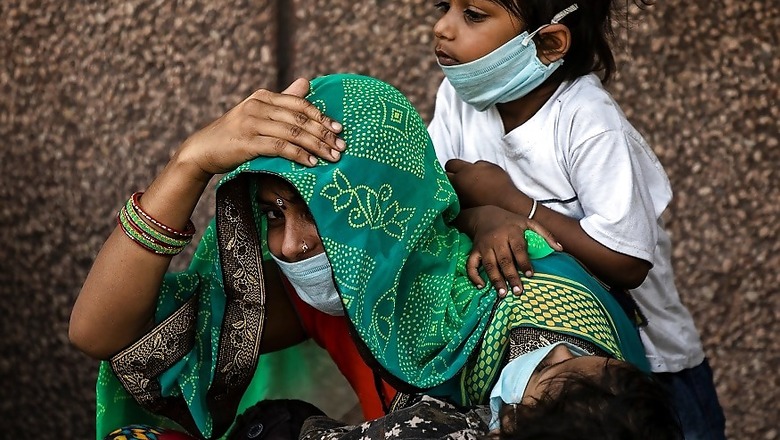
views
A string of news articles, closely connected, yet not seen perhaps as a whole, could be seen as a confirmation of what many experts have been trying to bring to everyone’s attention for quite some time -- that Covid-19 pandemic and the state’s response to it has hit women much harder than it has affected men.
Take for instance, the number of protests held by nurses across government hospitals in the country.
Recently nurses went on strike at Mumbai’s KEM and Delhi’s AIIMS hospitals demanding better protection against coronavirus and more reasonable shift timings, after their colleagues had staged an agitation at Hyderbabad’s Gandhi hospital for the same reasons.
In some of the videos shared by them, the healthcare workers are seeing attending to patients wearing nothing else than dupatta for want of PPE kits and N95 masks.
Women who make for 85% staff strength of the nation’s health workers (according to Periodic Labour Force Survey 2017-18), and whom Prime Minister Narendra Modi has called India’s ‘Corona Warriors’, have arguably been exposed to a greater degree of risk than their male counterparts.
Just as has been the case with Accredited Social Health Activist (ASHA) workers. Asha workers, who have been tasked with the duty of conducting door-to-door surveys of people suspected of being infected with COVID-19, have been not just exposed to the virus itself but subjected to abuse and assault on the field. In April alone, reports of assault on Asha workers came from Faridabad, Bengaluru and Vijaypura.
“We are taking for granted the work that women have been putting in to get the country out of this pandemic. They are overworked, undercompensated workers whose dismal working conditions the state does not recognise. But when India got into this massive crisis, suddenly everyone remembered that we have all these women. I think we should have been careful about the gender impact of the way we are deploying women into countering the pandemic,” says Jashodhara Dasgupta, a senior advisor at the non-profit organisation SAHYOG.
She said that by deploying women in the fight against coronavirus, the state has not only ignored their role, their contribution, but put them in harm’s way by not ensuring better working conditions for them.
Women not just in the health sector, but in all sorts of roles from homemakers to migrant labourers are, are suffering from an ‘invisiblisation’, says Sona Mitra, principal economist at Initiative for What Works to Advance Women and Girls in the Economy (IWWAGE).
“This is actually happening right now. Women migrant workers are losing out to their male counterparts in terms of jobs. Women workers are unregistered and automatically excluded from many welfare schemes. All safety nets are going to miss them. Secondly, they are already working six times as much when it comes to domestic chores. Now with lockdown in place, with pressure on feeding more mouths, all the stress is coming onto the women. The quantum of unpaid work is increasing for them,” Mitra said.
She said that before the lockdown, schools would provide meals to children, there were anganwadi daycare centres to help mothers out. But now the issue of food insecurity has increased and it is mostly upon women to find solutions.
With food insecurity, Mitra added, the cases of female malnutrition and anemia, for pregnant and breast-feeding women, are also going to increase.
“The government has not recognised these fundamental issues. They think that by providing extra cooking gas cylinder and Rs 500 these problems are solved. What they have given to women… these are shameful amounts,” Mitra added.
Dasgupta apprehends that lockdown is going to have a long-term impact on the job scenario for women. “Through the years, despite dismal work conditions, women have overcome various challenges to seek jobs and independence for themselves, though their workforce participation rates are still low. But we suspect that women who have lost their incomes, their jobs might be asked to return to their homes. It is going to further skew the labour participation of women. They will be tremendously discouraged from working for at least the next one year.”
Both the experts said the long-term confinement would also have detrimental effects on the safety and menstrual hygiene of women who need, but cannot afford, sanitary pads.
“Women organisations have already been observing surges in violence. With women locked inside their homes with their perpetrators, it gets difficult to talk on phone and report crimes. They are under constant surveillance by family members. Getting contraception is going to be tough. There are already reports of an extremely high number of unwanted pregnancies happening because of all this,” Dasgupta added.
Expanding the scope of the public distribution system, increasing the number of work days under the Mahatma Gandhi National Rural Employment Guarantee Act (MGNREGA) to 200, and directly transferring cash in the hands of the poor, say experts are the solutions to mitigate these huge challenges that India faces right now.


















Comments
0 comment